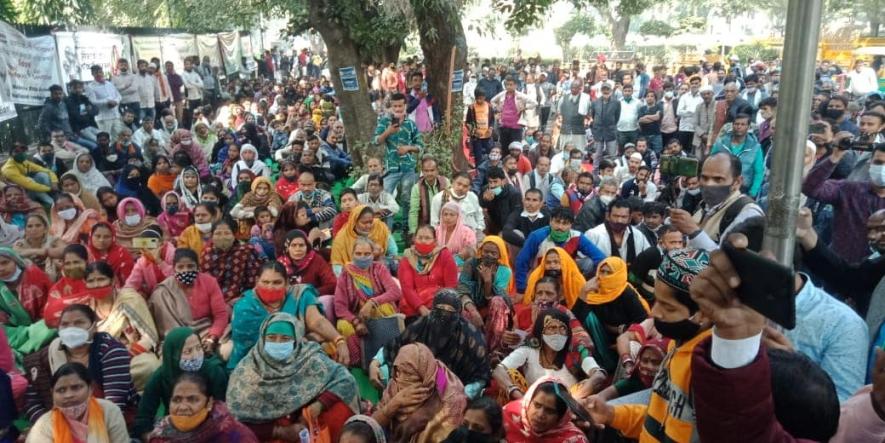Delhi: With Street Vendors’ Shield Still ‘Only On Paper’, Life Remains Unchanged for Many

The protesters at Jantar Mantar were led by National Hawkers’ Federation (NHF).
It’s been months that Azhar is struggling to eke out even a hand to mouth existence. “What to do,” says the sole earner in his family, who hawks garments in East Delhi’s Seelampur, “there is no business only.”
Yet, there is a “bigger problem” than the low earnings that the street vending business has often been associated with, which the 32-year-old has been facing – now more than ever, post-pandemic. The issue arguably characterises this segment of the country’s large unorganised sector- the whims of the city corporation officials and the traffic police, along with their extortionary practices.
The out-turn of this element is a disturbing reality – roots of which lie in the unregulated nature of street vending in the country – where lakhs of street vendors across the nation find themselves in a no-win situation. And, precisely to address this, in other words, to ‘regulate’ this source of employment and livelihood for the urban poor, an act namely, Street Vendors (Protection of Livelihood and Regulation of Street Vending) Act, was legislated back in 2014.
On Wednesday, November 24, however, a protest demonstration at New Delhi’s Jantar Mantar saw hundreds of city’s street vendors lamenting that their lives largely remain unchanged even now, with many among them still allegedly falling prey to extortion rackets and continue to get harassed with eviction drives, that run unabated.
According to the protesters, the law meant to protect them “is only on paper”. They add that it’s been over seven years since the Street Vendors Act has come into force, and yet, the processes, including specification of vending zones, identification of street vendors, and issuance of certificates of vending – all, as prescribed by the 2014 law – are yet to see the day of light in almost all the major cities in the country, as well as in Delhi.
“It is like having to either live in constant fear of being forcibly moved from our business places or resorting to paying a certain amount to remain undisturbed,” said Azhar, who was one among those who protested on Wednesday.
Also present in the demonstration was Murti Devi, 60, who sells seasonal fruits and vegetables at Minto Road in Central Delhi. Sharing similar concerns, she said: “Already, COVID [the COVID-19 pandemic] has resulted in further dwindling of our incomes – it is now almost half of what we used to earn earlier. But even that doesn’t stop the police officials to demand money from us.”
Devi rued how there are some weeks when she is required to shell out at least Rs 500 “just to do the [vending] business.”
The protesters, hawking in numerous national capital’s markets including in Lajpat Nagar, Connaught Place, Janpath, Chandni Chowk, Ranjeet Nagar, among others, were led on Wednesday by the National Hawkers’ Federation (NHF), a coming together of over thousand street vendors’ unions in the country.
Sandeep Verma, convenor of federation’s Delhi unit, told NewsClick that particularly in Delhi, the process of implementing the street vendors’ protection law, a touchstone of the vending business, is “very slow,” and that the city’s hawkers are bearing out the cost of this “inordinate delay”.
“The Delhi government had issued the rules for the law back in 2017, while the scheme was rolled out in 2019. In that year only, about 28 town vending committees (TVCs) were notified. However, the process of identifying street vendors in the city is still going on at the moment,” Verma explained.
Under the 2014 law, the TVCs, each of which comprises members including local street vendors, state government officials, and representatives from NGOs, are tasked to identify the street vendors and issue them vending certificates. Subsequently, the committees are also empowered to identify vending zones in a city.
In Delhi, as per the Aam Aadmi Party (AAP) – led government’s figures, out of the estimated 4 lakh street vendors, over 70,000 have been identified till now. On Wednesday, NewsClick was informed that almost all among them have been identified by the respective TVCs coming under the three municipal corporations – North, East, and South – while the surveys haven’t been completed yet by the New Delhi Municipal Corporation (NDMC).
Once the surveys are completed, the ambiguity sustaining for who is an ‘approved’ street vendor and who is not is expected to be resolved. Subsequently, authorised vending zones, where these street sellers can be relocated, will be earmarked, ensuring that the rights of the vendors are honoured and that of the city’s pedestrians too.
Verma, however, complained that the survey, which should have taken not more than “some months,” has already taken years, further arguing that many genuine vendors in the city are even now excluded from the identification process for numerous reasons.
To further illustrate, he cited the figures of a ‘registration’ process of street vendors that was carried out back in 2007 in the capital. “Around 1.30 lakh registrations were made then only; how come then, that the population of ‘identified’ street vendors, now being told to us, is even lesser than that?” he said. The 2014 Act, to be sure, mandates 2.5% of the city’s population as being eligible for street vending.
Moreover, difficulties remain even for the ‘identified’ street sellers, as issuance of the vending certificate to them is delayed too, alleged Mohit Vallecha, member of NHF, who’s active in the East Delhi area.
Take, for example, Harcharan Jeet Singh’s case. On Wednesday, the 63-year-old, who sets up a food stall in Central Delhi’s Paharganj, claimed to have been surveyed multiple times by the TVC members in his zone. “They have told me many times that all my documents are valid and that I would get a certificate soon. However, I haven’t got one till now,” Singh, present at Jantar Mantar on Wednesday, told NewsClick.
According to him, he has also been threatened to be evicted in the past. He is often demanded to pay an amount, alleged extortion by the “police officials,” to continue his vending business.
Multiple eviction drives of street vendors in major markets of the city in recent months have also brought the burning issue over non-regulation of street vending in the national capital to the fore. Importantly, these drives are carried out despite the Delhi Street Vendors (Protection of Livelihood and Regulation of Street Vending) Rules, 2017 stating: “no street vendor must be evicted from the site of vending without prior notice, completion of registration process and formulation of a rehabilitation plan.”
Shaktiman Ghosh, national general secretary, NHF, told NewsClick that the federation, through Wednesday’s protest, is pressing for immediate implementation of the Street Vendors Act and identifying vending zones for the city hawkers across all the states.
“In Delhi, amidst the delay in doing so, even the courts are being misled by the traders and market associations,” he said, alluding to the petition over illegal hawking that was filed recently in Delhi High Court. “We are fighting such matters legally in every manner possible. But, we believe it is also important to put pressure on the Delhi Government and the MCDs to expedite the survey process.”
Meanwhile, activists partaking in Wednesday’s protest also highlighted that the provisions under the Delhi Master Plan 2021, prepared by Delhi Development Authority and which got notified in 2007, do not consider the 2014 Street Vendors’ Law.
The DDA, whose chairman is the Lieutenant Governor of Delhi (LG), is a Union Government’s body and comes under the administrative control of the Ministry of Housing and Urban Affairs. The Master Plan is a statutory document with the power of law to govern urban development in the national capital.
“The 2021 Master Plan makes no mention of the Street Vendors Act. Instead, it retains provisions that do not reflect the criteria set out for street vendors as per the 2014 law,” Shalaka Chauhan, coordinator, Main Bhi Dilli campaign, told NewsClick. This month, the NHF also approached the Delhi HC to challenge the 2021 Master Plan over similar lines.
The matter is scheduled to be heard on January 12.
Get the latest reports & analysis with people's perspective on Protests, movements & deep analytical videos, discussions of the current affairs in your Telegram app. Subscribe to NewsClick's Telegram channel & get Real-Time updates on stories, as they get published on our website.
























